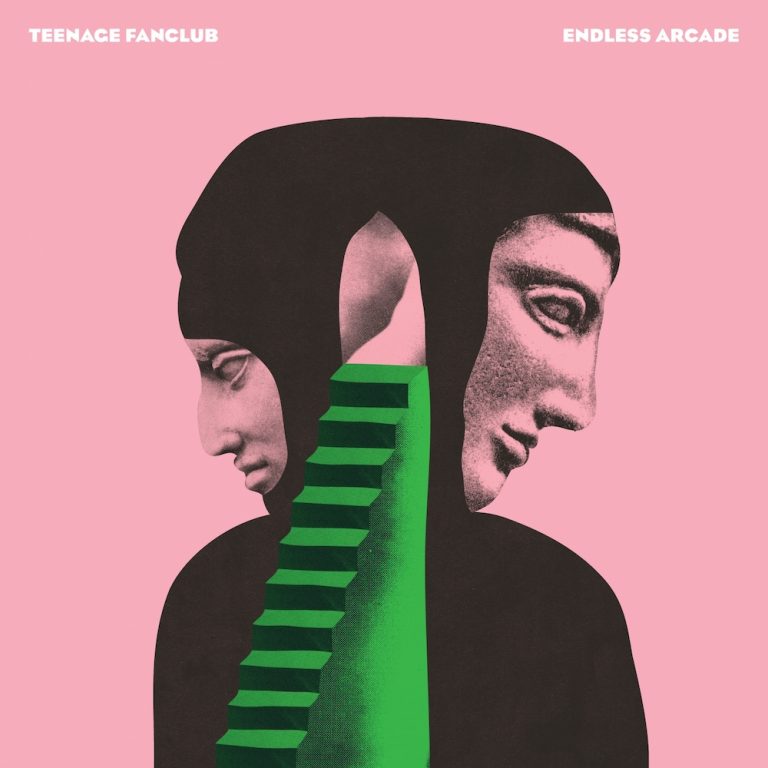“I think of an endless arcade as a city that you can wander through, with a sense of mystery, an imaginary one that goes on forever…” said Raymond McGinley on the title given to his band Teenage Fanclub’s latest, and 11th, album. It’s an intriguing concept — one that captures the appeal of cities for so many. For some, they symbolize possibility and hope, and moving to one often comes at a time of significant life change. For others, they’re places of escape, to lose oneself and have a go at reinvention.
Yet, interestingly, most of the lyrical content throughout Endless Arcade centers on a longing for something lost. The lyrics of the marching “Warm Embrace” read like the confession of a regretful runaway partner; “Choose my clothes from a black suitcase / Painful thoughts that I can’t erase”. Single and opening track “Home” hits on something similar over a breezy yet melancholic chord progression; “I sometimes wonder if I’ll ever be home again / I just don’t know when I’ll open that door again,” Norman Blake sings. Here, home means more than a physical space; it’s a return to a loved one and reliving the memories they shared. In other words, it’s a metaphor for loss. These songs, and most others on the album, make for an interesting argument: what’s the purpose of a new home, an endless arcade, if one’s only focusing on the past?
Despite its theme and six-plus minute runtime, “Home” is also one of the most melodic tracks on the album. It helps make clear that Endless Arcade is a quiet record that helps reaffirm Teenage Fanclub’s enduring appeal: their songs can help dull the pain. And pain there is. The sparkling guitars and lullaby vocals on “The Sun Won’t Shine On Me” help balance out arguably the most depressing lyrics on the album (“With a troubled mind I am in decline”). “In Our Dreams” opens with a crunchy guitar hook that quickly leads into an eerily sweet melody of bubbling keys and vocals that fade out over the line “We lived the dream but we never knew.” Yes, the song is more introspective than others, with other lines like “A memory isn’t always true” hinting at memory’s unreliability. Yet “In Our Dreams” nonetheless centers around what could have been (again), and how one can take the past for granted.
This brings listeners to an underwhelming realization; for an album named after an idea of endless mystery and possibility, Endless Arcade gets fairly repetitive. “Come With Me”, despite its more optimistic message, is the first track that sonically crosses the line into diminishing returns, sounding like a more tentative “The Sun Won’t Shine On Me”. “Back In The Day”, with its facepalm-obvious title, is a sweet yet straightforward track and adds nothing new to the issues Teenage Fanclub’s music is trying to work through.
Fortunately, the album occasionally breaks away from this formula to deliver some strong moments. The uplifting, barroom-inspired “I’m More Inclined” makes for a pleasant change of pace; the song’s playful instrumental guitar break makes for a good contrast to the one heard in “Home” (“Or I could take the path that leads me back to you,” Blake sings, free of hesitance or regret). “Everything Is Falling Apart”, which opens with an Atlas Sound-like hush, sounds like nothing else on the album, building up with a particularly forward-moving bassline and painful harmonies before descending into a shoegaze-inspired interlude.
The album’s title track — understated yet pulsing with rhythm — is another highlight; its mood is dark, almost sinister, but not sad. “Don’t be afraid of this life” goes the chorus before getting into specifics; “Of the dreams you delayed / Of the price that you paid,” each line accompanied by a guitar strum that delivers a dose of positive energy. “Endless Arcade” is the kind of song that captures what it’s like to sort oneself out and the spectrum of emotions that come with it. It’s the kind of song that makes listeners thankful that Teenage Fanclub are still at it, 11 albums and counting.

